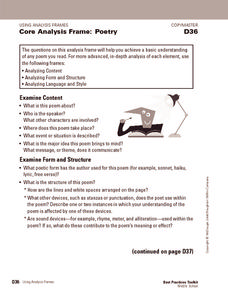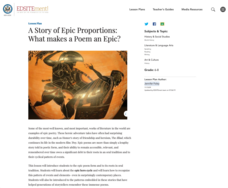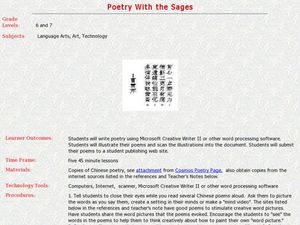Houghton Mifflin Harcourt
Core Analysis Frame: Poetry
Dig deep into any piece of poetry with a set of analysis questions. Ponder the content, form, and language of poetry and provide some question for critique. The first two pages include general questions, and the remainder of the document...
Utah Education Network (UEN)
7th Grade Poetry: Ode Poem
Walt Whitman's "Captain, My Captain" and Robert Frost's "The Road Not Taken" provide seventh graders with examples of odes. After reading and discussing these and other examples, young poets craft an ode and respond to the ode of a...
Curated OER
Edward Lear, Limericks, and Nonsense
Introduce your class to the delights of nonsense poetry and explore literary devices with the writing of Edward Lear. Learners identify rhyme and meter as well as figures of speech, alliteration, and onomatopoeia in "The Owl and the...
KIPP 3D Academy
Epic Poetry Unit
The Odyssey is the core text in this unit study of the hero's journey motif. Along the way, kids research Greek and Roman history, mythology, art, and epic poetry. The 104-page packet is perfect for homeschool or classroom situations and...
Learning for Justice
Maya Angelou
Maya Angelou's poem, "Still I Rise", offers young scholars an opportunity to consider how poets use literary devices to create powerful messages. After a close reading and discussion of the poem, class members reflect on how they can...
National Endowment for the Humanities
A Story of Epic Proportions: What Makes a Poem an Epic?
Learners analyze the epic poem form and its roots in oral tradition. In this epic poetry activity, students research the epic hero cycle and recognize the pattern of events and elements. Learners analyze the patterns embedded in the...
MENSA Education & Research Foundation
Magical Musical Tour: Using Lyrics to Teach Literary Elements
Language arts learners don't need a lecture about poetry; they listen to poetry every day on the radio! Apply skills from literary analysis to famous songs and beautiful lyrics with a instructional activity about literary devices. As...
Curated OER
Poetry With the Sages
Students write poems and input them into a word processing program. For this poetry lesson, students listen to Chinese poems and draw mental images. Students compose poems and illustrate them. Students share their work.
K12 Reader
"How Do I Love Thee?" Supporting Ideas
Show your class what poem the famous line "How do I love thee? Let me count the ways" comes from. Class members read Elizabeth Barrett Browning's poem and respond to one question with a short paragraph. The question asks learners to use...
Curated OER
The Effects of Slavery
The emotional and spiritual oppression of slavery in the African-American experience is the focus of this instructional activity. Middle schoolers analyze various texts by Frederick Douglass and Maya Angelou related to freedom and...
Lafayette Parrish School System
Teaching Tone and Mood
Tone and Mood are not synonymous! Introduce young readers to these literary devices with a series of exercises that not only point out the significant differences between the terms but also shows them how to identify both the tone and...
Curated OER
Thornton Wilder's Our Town: The Reader as Writer
Students read a play and create their own play using Thornton Wilder's Our Townas a resource. In this play lesson, students analyze how theatrical elements contribute to a play's meanings and effects. Students recognize differences...













